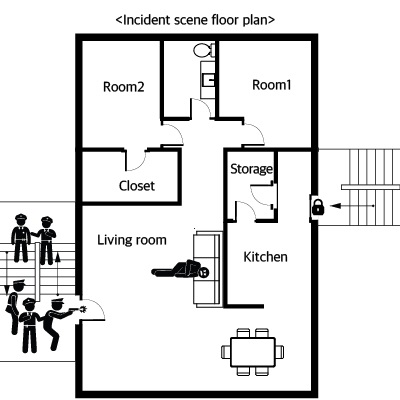In the past seven years, 31% of those shot by the Los Angeles Police Department were found to be suffering from mental illness, indicating that cases similar to the shooting death of Yong Yang on May 2 are all too common.
Bodycam footage released by the LAPD on May 16 shows a lack of clear guidelines or instructions for deciding when to use force in various situations.
When Olympic Station Supervisor Sergeant Ruvalcaba arrived on the scene, he informed Min Yang, the victim’s father, about potential scenarios during entry, stating that “use of force” might be necessary.

The problem is that “use of force” encompasses a wide range of actions, including the use of non-lethal weapons or physical restraint. Without offering a precise explanation of what “use of force” entailed, Sergeant Ruvalcaba merely said, “He might get hurt.”
Sergeant Ruvalcaba also suggested to the family that they could have their son arrested for trespassing to get him out of the house. To a family considering hospitalizing their mentally ill son, this proposal implied that the police would treat him as a criminal by using force. The family likely never imagined that lethal force would be part of this scenario.
The basis and criteria for deciding the use of force were also unclear. Despite two failed attempts to communicate with Yang, the officers were fully aware that he was suffering from mental illness, based on their attempts and the family’s testimony. Until this point, there was no threatening situation.
Despite the absence of any immediate threat, Sergeant Ruvalcaba suddenly stated, “We’re going to have a use of force.” Yong Yang had not responded to the officers’ requests to come out and had not communicated with them, but this did not justify the decision to use force.
There is also doubt as to whether shooting was the best response. The bodycam footage shows that the officer with the non-lethal “bean bag” gun was positioned behind the lead officer. This demonstrates a clear flaw in the LAPD’s response policy.
When he opened the door, the lead officer in the front did not have his gun drawn. He only drew his weapon in a hurry after seeing Yong Yang with a knife, indicating a lack of preparation or consideration for multiple scenarios before entering.
This lack of readiness is further evidenced by the behavior of the officer with the “bean bag” gun, who did not even attempt to use it. The officer in the front stepped back, drew his gun, and shouted “Drop it [the knife]” but did not try to use the non-lethal option. This raises questions about whether the officers had any plan or intention to safely bring out Yong Yang.
Experts agree that improving the response to individuals with mental illness requires more comprehensive training for officers and the presence of psychiatric professionals on the scene.
The officer opened fire at Yong Yang just eight seconds after forcibly opening the door, which indicates insufficient training.
The LAPD has operated the Systemwide Mental Assessment Response Team (SMART), composed of officers and LA County mental-health clinicians, since 1993. However, in early 2021, SMART responded to fewer than one-third of mental health-related calls.
According to an LAPD audit report, more than 70% of radio calls requesting SMART assistance in 2022 were not fulfilled due to a lack of personnel.
Councilmember Eunisses Hernandez (District 1), who has been vocal about police shootings, stated, “The necessary budget to support mentally ill residents is not being provided. Unless the city and county invest in crisis-response teams, officer-involved-shooting incidents will continue.”
Yong Yang was not a criminal. His death was the tragic result of an inadequately trained LAPD officer’s poor response to a person with mental illness.
By Mooyoung Lee lee.mooyoung@koreadaily.com


![Clovine accelerates global expansion in collaboration platform market Website of Clovine, a cloud-based project management provider [Screenshot]](https://www.koreadailyus.com/wp-content/uploads/2025/04/0403-clovine-100x70.jpg)

![Hangar images indicate North Korean advances in military drone domain Satellite photos taken on March 28, included in Beyond Parallel's report on North Korea, shows what appears to be seven new drone hangars at the Banghyon Air Base. [SCREEN CATPURE]](https://www.koreadailyus.com/wp-content/uploads/2025/04/0402-Hangar-100x70.jpg)
